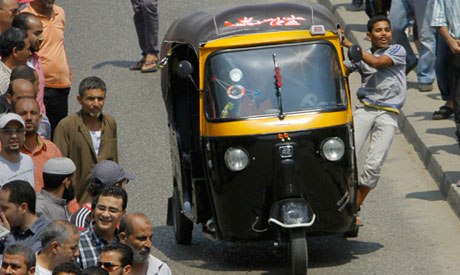
On 5 September Prime Minister Mustafa Madbouli announced a scheme, beginning next year, to gradually replace tuk-tuks with safer, licensed vehicles
Tuk-tuks began to spread in Egypt in the late 1990s, first in small villages in rural areas where roads are often too narrow to accommodate larger vehicles, and then in informal areas of cities. The tuk-tuk is now a regular sight in districts that are often characterised by unpaved and uneven alleyways, a popular means of transport for inhabitants in areas where taxis seldom venture even if the streets are wide enough.
Despite their spread, tuk-tuks have never been licensed. Some tuk-tuks are driven by children, and there is plenty of anecdotal evidence suggesting that, because they operate without licence plates and are therefore untraceable, the vehicles are used in criminal activity.
On 5 September Prime Minister Mustafa Madbouli announced a scheme, beginning next year, to gradually replace tuk-tuks with safer, licensed vehicles. The replacement minivans will operate on natural gas.
The replacement programme will be overseen by the Ministry of Finance in cooperation with other concerned parties, according to a cabinet office press release.
The Central Agency for Public Mobilisation and Statistics estimates there are three million tuk-tuks on Egypt’s roads. Last year Cairo governorate did begin a pilot scheme to issue number plates for the vehicles, allowing police to monitor them, but it was only ever a temporary solution and extended to less than 100,000 tuk-tuks.
Am Ramadan, 59, a small holder from a village in Upper Egypt, has been driving a tuk-tuk for the past six years in order to make ends meet. Charging a minimum of LE5 per ride, the motorcycle-drawn vehicles have become a popular way for many people to earn extra cash to support their families.
Ramadan does not own the tuk-tuk he drives outright but shares it with another driver. He worries that under the replacement scheme he may make less money.
“Swapping the old tuk-tuk for minivans is not a bad idea. What worries me is that I might not be able to afford the installments for the vehicle. I also wonder if the new cars will be able to traverse the narrow streets and reach the doorsteps of my customers,” he says, adding that he is often asked to deliver groceries to customers’ houses.
“For the passengers the new cars will probably be more comfortable, and if they use natural gas, fuel costs will be cheaper which is no bad thing.”
Regular tuk-tuk user Mona Abdel-Salam sees several advantages in the replacement scheme.
“They will be safer,” she says, “since there will no longer be any risk of bouncing off, which can sometimes happen when tuk-tuks drive too fast on rutted and uneven streets. And the minivans will be licensed, which means there is less chance of the driver being involved in any criminal activities.”
While the cabinet’s plans are generally being welcomed, some questions remain to be answered.
“When will they start the replacements?” asks Ramadan. “And how much will we be expected to pay?
“What will happen to those who do not exchange their tuk-tuks? And is the scheme only open to existing tuk-tuk owners or will others be allowed to apply for the minivans?”
Cabinet Spokesperson Nader Saad says the prime minister will soon schedule a meeting with tuk-tuk factory owners to ascertain how quickly they can shift to producing minivans, and that other details of the roll-out will be forthcoming.
*A version of this article appears in print in the 12 September, 2019 edition of Al-Ahram Weekly under the title: Tuk-tuks: A last ride?
Short link: